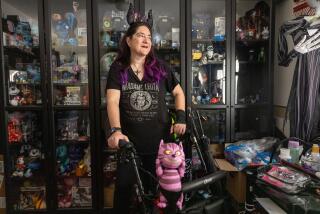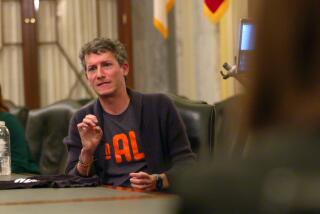Helping Make Life Easier for Those Who Have Down’s : Convention: Actor Chris Burke, who will speak at Anaheim gathering, has become a role model for youths with the condition.
- Share via
“Life Goes On”--the acclaimed TV series about a family with a son who has Down’s syndrome--won’t return this fall. But the impact its young star, Chris Burke, has had on America’s image of the mentally handicapped continues to be strong.
During the four-year run of the ABC family drama, Burke’s character, Corky Thacher, went to high school, made friends and suffered ridicule. He worked as a waiter in his father’s restaurant and landed another job as a movie theater usher. He also dated and, in the final season, got married.
In the process of showing what life can be like for someone with Down’s syndrome, “Life Goes On” raised public consciousness and Burke became a role model for children and young people with the genetic disorder that causes various degrees of mental retardation in one of every 800 births.
“He’s done more for Down syndrome than anybody has ever done,” says Joyce Taylor of Lake Forest, a past president of Parents Regional Outreach for Understanding Downs (PROUD) in Orange County. “He has made it acceptable to have Down syndrome, in my opinion.”
Burke, a 27-year-old native New Yorker whose life story is chronicled in the book “A Special Kind of Hero,” will be a featured speaker at the 21st annual Down Syndrome Convention, which begins Aug. 27 at the Anaheim Hilton.
Sponsored by the Atlanta-based National Down Syndrome Congress, the three-day convention is expected to draw more than 2,000 parents, professionals and family members for sessions ranging from medical issues and new technology to estate planning and communication.
The convention theme is “Follow the Dream, Catch the Vision.”
“It’s our dream,” explained convention co-chairman Frank Murphy, “to have our kids accepted in the total population just as another human being, another child, another adult. That’s what we’re trying to accomplish, and we want everybody else to a catch onto that bandwagon and make it real.”
Murphy, executive director of the Atlanta-based National Down Syndrome Congress, acknowledged that the barriers to achieving that goal “are coming down slowly but surely. The biggest inroads lately have been made in education.”
Nationwide, a growing number of school districts are now including developmentally delayed children in regular classrooms, a process known as full-inclusion. In several cases where school districts and parents have gone to federal court over the issue, Murphy said, the courts have ruled in favor of the parents to permit their children to participate in regular classrooms.
*
Judi Marshall of Huntington Beach understands the importance of including Down’s syndrome children in a variety of activities.
Her 5-year-old daughter Courtney, who has Down’s syndrome, “was in a dance recital, she goes to swimming lessons, and she is going to go to the regular kindergarten--not a special-education kindergarten--in our neighborhood.”
Courtney won’t begin school until the fall of 1994, Marshal said, but “I am so excited that I can’t even tell you.
“My biggest reason for wanting Courtney to be fully included is that I know from what I’ve seen with her so far that she does best with children her age. She just fits right in. And the kids are very helpful and understanding in most cases.”
Marshall, a member of PROUD, feels it’s important for her daughter to be “included” in all aspects of her life. “That’s why she’s in a regular dance studio. She may not do it as good (as the others), but she does do it. I think if you just treat them as normal and make them get out there and do the things that other kids are doing that they’ll be better accepted.”
*
Fellow PROUD member Joyce Taylor, whose 10-year-old daughter Sydney has Down’s syndrome, agrees.
After a lengthy battle with the Saddleback Valley Unified School District, Sydney began attending regular second grade elementary school classes in Lake Forest in 1992. This fall, she’ll enter third grade.
“I feel she very successfully completed the second grade, which means she left having met those goals and objectives that were set up in an individual education plan for her,” said Taylor. “She’s grown immeasurably in her capability and her ability to be out in the world. Which is what our goal is, (for her) to be self-sufficient.”
And if Sydney had not been fully included in school?
“First of all, our school district at the time of the hearing felt she’d probably never read, and she now reads very strongly at a second-grade level,” said Taylor. “I suspect she would not have made the progress she made academically and socially, although that’s still the greatest area of adjustment for her because she’s still learning what is expected of her in a regular environment.”
Taylor recalls that when “Life Goes On” first went on the air, educators told her that Chris Burke was among the highest functioning people with Down’s syndrome and that they shouldn’t expect as much from their daughter.
“Well, we have a child who is (also) capable of memorizing, speaking and handling herself,” she said. “I think Chris has a very unique talent, but to be told my child is going to be so much lower-functioning. . . . “
Taylor acknowledges that in discouraging them from hoping that their daughter could function as well, the intention was that they wouldn’t be disappointed if she fell short.
But, she said, “doesn’t every mother of a normal child probably think their child has the potential of being a Miss America or President of the United States? Very few are going to be that, but imagine if we didn’t value children as if they could be those things.”
It comes down to how parents perceive their children, she said. “It’s not that we have unrealistic expectations so much that we have expectations. And let the child be the one who decides whether they can rise to that.”
In watching Sydney “blossom into the little butterfly that she is, it’s not easy for her and not easy for us as parents to go through a lot of what she’s going through, but we’re seeing her rising, exceeding our expectations of her in many ways.”
Not that Taylor wants to paint “this Pollyana picture that it’s always great.” It’s not, she said.
“There’s not any child in life that doesn’t wear braces, or is chubby, has pimples, self-esteem problems, or whatever. I just say we can’t put limits on our children, and we’ve got to see what’s in them that other people can’t see.
“I did that with all my children. Why shouldn’t I do that with this one?”
More to Read
Sign up for Essential California
The most important California stories and recommendations in your inbox every morning.
You may occasionally receive promotional content from the Los Angeles Times.










